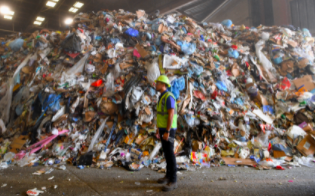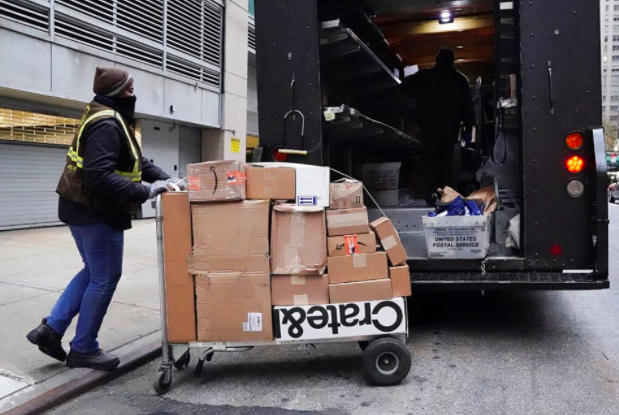The ugly reality of returning gifts
In a world and culture of excess, having surplus is a practice more common than we think. Parents or family members tend to feel obligated to buy more than enough, just in case their gift-reciever isn’t 100% satisfied. Whether that means buying a sweater in two different sizes or a backpack in two different styles, today’s culture relies on the security of returning whatever they don’t need.
A UPS worker in New York City transports packages on Black Friday Nov. 26, 2021. (CNS/Reuters/Carlo Allegri)
Now that the holiday season has come to a close, we enter a new season, one of returning unwanted gifts and items purchased during the famous shopping months.
In a world and culture of excess, having surplus is a practice more common than we think. Parents or family members tend to feel obligated to buy more than enough, just in case their gift-reciever isn’t 100% satisfied. Whether that means buying a sweater in two different sizes or a backpack in two different styles, today’s culture relies on the security of returning whatever they don’t need.
People assure themselves that their unwanted pair of shoes will simply find a different owner, taking pride in their supposed diligence. But is this actually the case?
The Truth
According to Optoro, people return $380 billion worth of product each year, the holiday season consisting of $90 billion of that total, and the first week of January consisting of $30 billion of that. And yet, most of those unwanted gifts will never see a shelf again, causing immense environmental damage.
In June 2021, ITV News analyzed footage of an Amazon warehouse in Dunfermline, Scotland, where the team discovered numerous boxes filled with perfectly good products in boxes labeled “destroy.” These collections were a combination of returns and items never sold. A former employee of the Amazon warehouse actually told the news outlet that the warehouse’s “target was to generally destroy 130,000 items a week.”
Most of the time, returned goods from corporate chain stores and massive online marketplaces are not resold, rather are trashed and end up in giant landfills. To these companies, it’s a hassle to manage the possibly imperfect items and/or deal with shipping, so instead, they just issue refunds, letting the customer to keep the product. Amazon is known for this custom, and it makes sense considering how little the situation is compared to their vast business.

This alarming reality should prompt us to reevaluate our actions and opinions. How can we help change this system, or make different choices that don’t jeopardize us all?
Breaking the Cycle
In a society accustomed to excess and built upon consumerism, the lack of knowledge on subjects like these can be detrimental to our future. If 88% of people have no understanding of these tragic realities of their world, our generations are blind to the consequences of their seemingly harmless actions.
To tell yourself that your actions are “nothing in the grand scheme of things” is a lie, for change requires each of our contributions. One way we can lessen these environmental impacts is by shopping consciously. All it takes is to be mindful of when and where you shop, only purchasing necessary items you will definitely keep. Carelessness creates the perfect situation for catastrophe.
With this mindful shopping, look for small businesses, which tend to refrain from wasting, in a way that giant companies don’t. Small businesses offer a sustainable route, steering clear of feeding into the huge, hurtful franchises.
Other options include reselling your items on popular networks like ThredUp, Poshmark, Depop, or eBay, or even just asking around to friends and family. Likewise, buying things second-hand never hurts. The misguided, negative view towards thrifting as risky and crude must be corrected, for chances are that those items are in a perfectly fine condition, and appreciating them can benefit all of us.
Sources:
https://makechange.aspiration.com/what-really-happens-when-you-return-all-your-bad-gifts/
https://www.ncronline.org/news/earthbeat/returning-unwanted-gifts-consider-true-environmental-cost
https://www.greenmatters.com/p/what-happens-store-returns
https://www.goingzerowaste.com/blog/the-best-pacees-to-resell-your-clothes-online/
https://www.ocregister.com/2019/05/17/your-recyclables-are-going-to-the-dump-heres-why/

Hills senior Julia Bang is looking forward to being on the Trailblazer for her final year. She joined the publication her freshman year as a staff writer and edited for the Life & Style and In-Depth sections in her sophomore and junior years, respectively. This year, Bang is excited to create content and manage stories alongside the entire editorial staff.
Fun fact: Bang is a "cafe enthusiast."












































